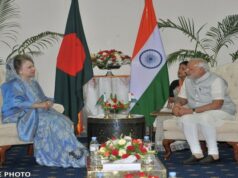Israel’s military has called up reservists, preparing for potential renewed fighting in Gaza if Hamas misses Saturday’s deadline to release more Israeli hostages, risking the collapse of the nearly month-old ceasefire.
Under the ceasefire deal in force since January 19, the Palestinian militant group agreed to free three more hostages on Saturday. But it said this week it was suspending the handover because of what it said were Israeli violations of the terms.
Trump’s Deadline
U.S. President Donald Trump responded by saying all hostages must be freed by noon on Saturday or he would “let hell break out”.
Prime Minister Benjamin Netanyahu warned on Tuesday that Israel would resume “intense fighting” if Hamas did not meet the deadline, but did not say how many hostages should be freed.
Amid growing concerns over the ceasefire, Israel’s prime minister said he had ordered the military to gather forces in and around Gaza, and the military announced shortly afterwards that it was deploying additional forces to Israel’s south, including mobilising reservists.
The standoff threatens to reignite a conflict that has devastated the Gaza Strip, internally displaced most of its people and caused shortages of food, running water and shelter, and pushed the Middle East to the brink of a wider regional war.
Israel Endorses Trump’s Threat
Israel’s officials said government ministers had endorsed Trump’s threat to “cancel” the Gaza ceasefire unless all the remaining Israeli hostages are released on Saturday.
Hamas has said it remains committed to the agreement but has not agreed to release the hostages on Saturday.
A Palestinian official close to the talks said mediators had stepped up their intervention “to prevent things sliding into a real crisis.”
‘Contacts Underway’
Asked for comment on where things stand, another Hamas official told Reuters, without giving details: “Contacts are underway.”
The Gaza war was triggered by the Hamas-led attack on southern Israel on October 7, 2023, in which at least 1,200 people were killed and more than 250 were taken as hostages into Gaza, according to Israeli tallies.
In response, Israel began a military offensive against Hamas that has laid waste the coastal enclave and killed more than 48,000 Palestinians, according to Gaza health officials.
Fears Of Regional Instability
Hamas has so far freed 16 Israeli hostages from an initial group of 33 children, women and older men to be exchanged for hundreds of Palestinian prisoners and detainees in the first stage of the multi-phase ceasefire deal. In addition, it has also returned five Thai hostages in an unscheduled release.
Negotiations on a second phase of the agreement, which mediators had hoped would include agreement on the release of the remaining hostages and the full withdrawal of Israeli troops from Gaza, were supposed to be underway in Doha but an Israeli team returned home on Monday, two days after arriving.
Demand For Continued Truce
Thousands of protesters in Israel have called on the government to continue with the ceasefire deal to bring the remaining hostages back.
A plan announced by Trump to take over Gaza, move out its more than 2 million Palestinian inhabitants and redevelop it into an international beach resort could also fuel regional instability, senior Arab officials said on Wednesday.
Arab League Secretary-General Ahmed Aboul Gheit told a summit in Dubai that Trump’s vision for Gaza could lead the Middle East into a new cycle of crises with a “damaging effect on peace and stability.”
Catastrophe Feared
Palestinians fear a repeat of the “Nakba”, or catastrophe, when nearly 800,000 people fled or were driven out during the 1948 war that led to the creation of Israel. Israel denies the account they were forced out. Trump has said they would have no right to return under his vision for Gaza.
Trump has said the Palestinians in Gaza could settle in countries such as Jordan, which already has a huge Palestinian population, and Egypt, the Arab world’s most populous state. Both have rejected the proposal.
Emergency Arab Summit
Egypt will host an emergency Arab summit on February 27 to discuss “serious” developments for Palestinians.
Aboul Gheit said the idea of the Arab Peace Initiative drawn up by Saudi Arabia in 2002 in which Arab nations offered Israel normalised ties in return for a statehood deal with the Palestinians and full Israeli withdrawal from territory captured in 1967, would be reintroduced.
Trump Seeks Israel-Arab Ties
Trump wants Saudi Arabia to normalise ties with Israel. Such a normalisation would be a strategic and diplomatic gain for Israel because Saudi Arabia is home to Islam’s holiest sites and has vast influence in other Arab and Muslim countries.
Under his first administration, Trump brokered the so-called Abraham normalisation accords between Israel and some Arab states, including the United Arab Emirates, a regional business and finance hub.
In Saudi Arabia’s most recent statement on the issue, it said it would not establish ties with Israel without the creation of a Palestinian state.
(With inputs from Reuters)





